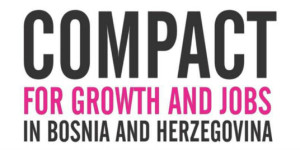The recently announced “Compact for Growth and Jobs in Bosnia and Herzegovina” is a pragmatic and non-partisan agenda for rapid economic growth and job creation.
The Compact proposes cutting the size of government deductions from wages and salaries, boosting job creation by simplifying employment rules, cutting back bureaucracy and making it more transparent, securing more investment in BiH jobs, and making social protection policies more effective, efficient and equitable.
This may seem like a tall order but the EU-led process of identifying strategic problems in the economy and proposing ways of tackling each of these problems has brought together an extraordinary breadth of experience.
A “Forum for Prosperity and Jobs” was convened over two days in late May this year. It brought together representatives of government, business and workers, along with international and domestic economic experts and BiH citizens who have insights on running businesses and creating jobs.
Consultations with stakeholders continued after the Forum through vigorous and detailed discussion on social media, and through direct talks with political parties, business associations, employers’ associations, unions, academic experts, and state and Entity agencies. Input was collected and further refined at a seminar in mid-July that examined ways of implementing the Forum proposals in practice. Experts from neighbouring countries shared their experience with local participants.
The Forum initiative has seen one of the most comprehensive and vigorous consultations on economic reform ever carried out in Bosnia and Herzegovina. No one believes the economy can be fixed overnight, but the Compact for Growth and Jobs – which is the result of this extensive consultation process – reflects an overwhelming consensus about the steps that must be taken.
The six priority reform measures would be implemented by the authorities after the October elections. They have been endorsed by the IMF, World Bank Group, EBRD and the European Union, which have plans at the ready to help with their implementation and to provide financial assistance to alleviate any short-run difficulties. In addition to the likely economic impact, the reform package will help Bosnia and Herzegovina to move closer to European Union membership by preparing BiH companies to compete in the EU single market.
Many citizens may throw up their hands and ask whether yet another economic reform initiative has any real chance of improving conditions on the ground. Proponents of the Compact,
however, stress that this initiative is non-partisan; it is pragmatic; and it has been carried forward through the broadest possible discussion among citizens from every walk of life. It is “a compact” – an agreement – not something imposed from above, and this, in addition to the substance of the proposals themselves, gives it a very good claim to popular support.




